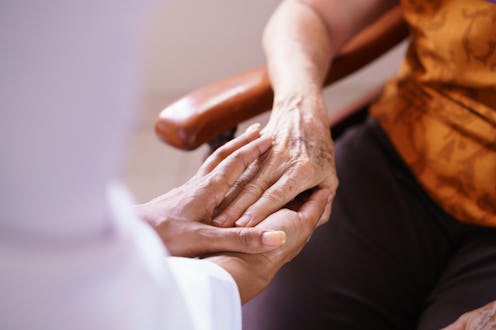Life
Your Self-Esteem Is Highest At This Age, According to Science

Your relationship with your self-esteem can sometimes feel like a tug of war. There are days where you wake up feeling amazing about yourself, and then, there are times where you’re your own worst enemy. While that ebb and flow of self-esteem is natural, a recently published review paper found that, like most things in life, feeling self-assured and comfortable with who you are as a person really just comes with age — age 60, to be exact.
The study, published in Psychological Bulletin, assessed how self-esteem levels change in people over the course of their lives. Self-esteem, the study notes, can influence things like a person’s social relationships, outcomes and success at school and at work, and even physical and mental health. Some highlights from the research: self-esteem increases in early and middle childhood, plateaus in adolescence (which should surprise no one who went through a high school awkward phase), strongly increases in young adulthood, and peaks from age 60 to 70 years old. It turns out that the iconic TV series Golden Girls might’ve been on to something.
Self-esteem in the study was defined as “a person’s subjective evaluation of his or her worth as a person.” The research statistically analyzed previous studies, drawing from longitudinal data across 331 independent samples that covered more than 160,000 individuals. Even after accounting for factors like nationality, ethnicity, and gender, self-esteem patterns across age didn’t significantly differ. After age 70, self-esteem levels did start to taper off, though the study notes the decline is “relatively benign” until age 90.
Now, you may be thinking, I have to wait until I’m 60 to start living my best life? But on the bright side, the study shows that self-esteem isn’t some fixed trait — you can work on improving your self-esteem throughout your life. And it often feels like unforeseen factors, like life transitions, stressful events, and the state of romantic relationships (or lack thereof), can dramatically impact our self-esteem. There’s something reassuring in knowing that aging acts as a self-esteem equalizer of sorts, regardless of those uncontrollable factors, since it’s inevitable that most people will turn 60 someday.
Life is full of ups and downs that will affect your growth as a person.
On top of that, pop culture certainly does make life in your 60s and beyond look pretty incredible. TV shows like Netflix's Grace and Frankie, alongside movies like The Book Club and Tea with the Dames that boast ensemble casts full of aspirational older women, make the golden years look truly, well, golden. These women and their characters seem confident, empowered, and like they don't care (or at least care considerably less) about what other people think of them.
We often treat self-esteem like a static trait, as if people are either born with it or without it, regardless of a person’s objective characteristics and how he or she is seen by others. But the results of this study are uplifting: life is full of ups and downs that will affect your growth as a person. So does this mean you have to wait until your 60th birthday to wholly embrace who you are? Well, it certainly gives us something to look forward to.